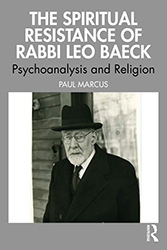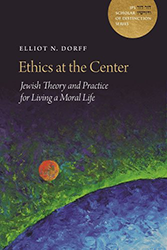In this book, Paul Marcus of the National Psychological Association of Psychoanalysis explores forty-three of the approximately 128 mishnayot (paragraphs) of Pirkei Avot through the lens of psychoanalysis. Each one is given an English subject heading — e.g., “Compassion,” “Submissiveness,” and “The Good Life.” He then provides an English translation of that particular mishnah, followed by well-known commentators’ elucidation. Marcus also reflects on the significance of each mishnah by drawing on psychoanalysts like Sigmund Freud, Melanie Klein, H. Kohut, D. W. Winnicott, and Adam Phillips. Marcus also cites relevant passages from twentieth-century existential philosophers such as Emmanuel Levinas, Martin Buber, and Gabriel Marcel. He lets the texts encounter each other rather than offering his own prescriptive readings.
For example, under the heading “Making Oneself Available,” Marcus delves into mishnah 20 of chapter 4: “Rabbi Mattithyah ben Heresh said: Be the first to extend greetings to every man; and choose to be a tail to lions rather than a head to foxes.” Marcus explains that enacting what the mishnah calls for can require work on the self through a psychoanalytic process. He also underscores how difficult it is to truly open oneself up to the other, to break through the rigidity of the ego. Here, he references Martin Buber’s concept of I‑Thou, which describes the need to acknowledge the other.
Marcus also points out that at times, a mishnah and psychoanalytic thought can be somewhat in conflict. Mishnah 5 of chapter 3 warns against staying up all night. Marcus, however, argues that being in the dark can be a psychological achievement — can be a time of creativity and openness to being alone with oneself.
At first, readers may see the book as being organized loosely. The topics discussed are discrete, so one can choose which headings are most interesting to them rather than going through them chronologically. In his conclusion, however, Marcus does argue that the book is built on five central claims: that psychoanalysis can offer underlying insights into what people consciously believe are rational and reasonable beliefs; that conscious and unconscious emotions affect belief structures not conceptualized by the rabbis of Pirkei Avot; that psychoanalysis can offer a more “in-depth and nuanced understanding” of the concepts he believes underlie the mishnayot; that psychoanalysis emphasizes how destructive humans are, which challenges the optimism of the rabbis; and that Pirkei Avot contains too much “superego morality,” or too much emphasis on what human beings should not do.
While these conclusions may of course be subject to counterclaims, Marcus’s book makes an argument for the enduring value of both psychoanalysis and Pirkei Avot.
Josh Hanft holds Advanced Degrees in English and Comparative Literature from Columbia University and curated the renowned reading series, Scribblers on the Roof, for over twenty years.





